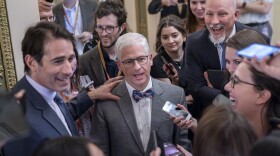North Carolina Congressman David Price on Monday announced he won’t seek reelection next year. The Democrat from Chapel Hill has represented North Carolina’s 4th District for more than 30 years.
WUNC's Will Michaels spoke with Congressman Price a few hours after his announcement. Their conversation is edited for length and clarity:
What have you been most proud of during your time in office?
PRICE: The big items would be things like the EPA lab that took nine years of appropriations work to build the preeminent environmental lab in this country. The work we did at the time of the recovery bill under Obama to build the National Guard and emergency management headquarters in Raleigh. There are many, many smaller projects, everything from Estey Hall on the Shaw university campus to farmers markets, to the Club Nova facility for young people with mental health challenges in Chapel Hill, and on and on it goes.
I suppose the flip side of that question is: are there things that you came into this position really wanting to do that you weren't able to do or are still in the works?
We have far too many partisan divisions in the Congress right now. They're not just divisions, but they're very extreme, especially on the right. I wear the "D" on my shirt very proudly, when I need to. But I also, as a member of this institution, need to make sure that it's not just me performing. It's the institution performing. And that applies to all kinds of infrastructure, it applies to child care, pre-K education, it applies to getting a break for families that need a break, for example, with this child tax credit.
I'm not leaving with some kind of pollyannish sense that everything's getting better and better. No, in some ways, it's better. But in some ways, it's not better, and we need to do a lot of work.
Are there particular projects or things that you would like to see happen, before you leave office?
I think our transit plan for the Triangle and the need for a commuter rail component for that plan, in particular. We need to get those plans in place. And we certainly have made progress and hope to make more progress on inner-city rail. You know, we've developed a very good train service, Raleigh to Charlotte, four times a day. Next step, probably to Richmond, to Washington, D.C. There are housing programs that I've made it a point to get back into business, like housing for the elderly, housing for people with disabilities, affordable housing that will let people live in the community they work in.
Your district has changed a bit in the past three decades. What has been the biggest change in representing your constituents over your time in Congress?
The district has indeed changed. You're right about that. And it's partly a matter of population growth. Congressional districting has been subject to extreme kinds of political interventions. There have been three versions of the 4th district in 10 years, and that is not good. That is not natural. Unfortunately, that is a decision that's in the hands of the partisan leadership of the Legislature, and that's not what we really need, which would be a bipartisan commission.
What advice will you give the person who fills this seat?
One of the blessings we have in the 4th district is a lot of groups that want to make things better. I was visiting yesterday with a major Habitat for Humanity observance in Orange County, and it reminded me of that all over again. There are a lot of civic-minded individuals and groups that politics needs to engage with and to and to amplify those voices. And so there needs to be a lot of listening, a lot of gaining understanding of what's going on and what people need, what people aspire to, and then just work at it. You do have to you do have to raise funds and in the world we live in, you have to be innovative in terms of your media strategies, hopefully not just tearing down the other side, but making very clear what you stand for and trying to enlist people to be part of your cause.
Any plans for retirement?
My plan is for the next 15 months to get to the point where I'll ask that question. And in the meantime, to continue to work very hard. There's plenty on the plate, believe me.







